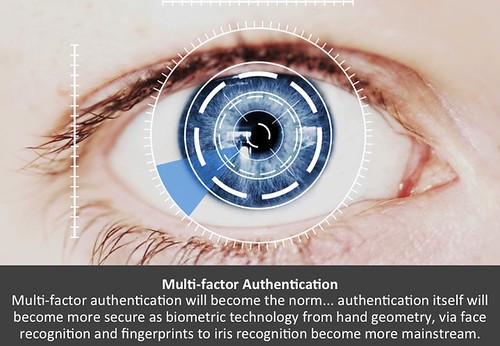Intro | Passkeys | Biometrics | Other Options
Introduction
- You may think that there's no need for this course
after seeing headlines like the following: - Passkeys may not be for you, but they are safe and easy -- here's why
answering common questions about how passkeys work; Ars; 5/12/2023 - Embrace the Passwordless Future of Passkeys LH; 5/9/2023
- Everything to Know About Passkeys for a Password-Free Future NYT; 1/11/2023
- Why Passkeys Will Be Simpler and More Secure Than Passwords TB; 6/27/2022
- A Big Bet to Kill the Password for Good Wired; 3/17/2022

is licensed under CC0 1.0
Passkeys
- Passkeys (aka 'multi-device FIDO credentials') authenticate you safely with a web service
- using biometrics: fingerprint and iris scanners, voice and facial recognition
- or other devices: phone, laptop, USB security tokens, smart cards
- FIDO2 is a very secure standard, and interoperable across devices;
it combines -- warning: geek speak!: - FIDO ("Fast IDentity Online") Alliance's Client to Authenticator Protocol 2 (CTAP2)
- World Wide Web Consortium (W3C)'s Web Authentication (WebAuthn) standard
- Benefits:
- convenient: use biometric or device authentication with sites instead of a password
- secure: client doesn't send password and sites don't store passwords -- no password-database breaches
- standard: tech giants, e.g., Apple, Google, and Microsoft, are starting to introduce passkey support;
e.g., Apple supports passkeys in iOS/iPadOS 16+, macOS 13+ (Ventura, Sonoma), watchOS 9+ - interoperable: passkeys are synced to whatever cloud storage method your device uses,
such as iCloud Keychain on Mac and iPhone or Google Password Manager on Android and ChromeOS - Drawbacks (current):
- device PIN: your passkeys could be accessed if someone has/guesses your device's weak PIN/password
- site support: limited number of web sites: passkeys.directory
- mixed platforms/ecosystems: e.g., Apple, Microsoft and Google
transferring credentials between different device families may not work smoothly (or at all) - older devices/OSes: you'll still need passwords if passkeys are unsupported
- missing/lost device, unrecognized biometric, share with a friend: you'll still need a password
- biometric spoofing: e.g., Attackers can bypass fingerprint authentication with an ~80% success rate
via fake fingerprints, if enough login attempts allowed (only high-profile targets need worry?) - government intrusion: you can be compelled to provide something you have: biometrics, device.
You currently can refuse to reveal something you know: PIN, password;
US courts have interpreted the Constitution's 5th Amendment (self-incrimination) differently;
Electronic Frontier Foundation (EFF) recommends using a PIN instead of biometric unlocks
for your device if you’re concerned about potential legal (or illegal) access by law enforcement.

is licensed under CC BY-NC-SA 2.0
Biometrics
- Even without passkeys, you can already use a fingerprint or face scan as a convenient shortcut,
or to augment Multi-Factor Authentication (which we'll cover at the end) - For now, you still need a strong passcode
for initial setup, after updates / restarts, and as a fallback. - Require passcode: periodically (set timeout preference), or immediately (after power off).
- iOS:
Settings > Passcode > Require Passcode: Immediately,
or After ___ minutes/hours - When travelling (esp. internationally) or leaving device unattended, unlike macOS,
there's no iOS 'Lock Screen' command to force a passcode prompt upon next wakeup. - Besides actually powering down the iPhone/iPad, another way to require a passcode:
~4 unrecognized fingerprint attempts, using a finger different from the ones used to train Touch ID. - Fingerprint sensor, e.g., Apple Touch ID: Accuracy? Strength? Injured digit? Gloves?
- If compromised, you can't change. Spoofed?
- video: Use Touch ID to unlock 1Password on your iPhone or iPad
- Facial recognition, e.g., Apple Hardware Security & Biometrics: Face ID: Accuracy? Strength? Face mask?
If compromised, you can't change. Spoofed? - Is vendor storing your biometric data, and how securely?
- Allow 1Password (or other password manager) to open your password vault with biometrics?
is it as strong as your primary password (and your device password) -- security vs. convenience tradeoff - Safer Internet: Browsing: Protect Passwords: Biometrics, Fingerprints, Facial Recognition; Passkeys
Other Options
- When applicable/available, passkeys are a huge security improvement over many users' poor password practices
- Some related current approaches are discussed under Storage: Apple Keychain, Single Sign-on
- However, a good password manager (PM) can provide these and other benefits today
while providing a transition to tomorrow: - central password: password for encrypted vault stronger than any device PIN/password
- secure, universal: works on all sites
- passkeys: included in newer PMs, e.g., 1Password
- interoperable: works across different platforms and on older OSes
- other info: store and fill-in, e.g., credit cards, personal info, etc.
- 1Password is finally rolling out passkey management
save passkeys and synchronize them across devices and platforms; Verge; 5/16/2023 - The Best Password Managers to Secure Your Digital Life some discussion of passkeys; Wired; 3/27/23
- We'll cover password managers more in upcoming sections.
